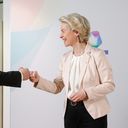EU chief outlines new Russia sanctions proposal ahead of visit to Kyiv

European Commission President Ursula von der Leyen and EU foreign policy chief Josep Borrell will visit Kyiv this week to meet with Ukrainian President Volodymyr Zelensky ahead of a global Ukraine fundraiser on Saturday.
The latest: Hours after announcing the visit, von der Leyen outlined a fresh sanctions proposal punishing Russia for the reported atrocities in the Kyiv suburb of Bucha.
Details: The proposal, which must be agreed to by all 27 EU ambassadors at a meeting on Wednesday, includes:
- A ban on coal imports, which are worth $4.4 billion per year
- A full transaction ban on four more Russian banks, including the second-largest bank VTB
- A ban on Russian and Belarusian vessels and road transport operators from accessing EU ports and roads
- Additional technology export bans worth $11 billion
- Other specific import bans worth $6 billion
Between the lines: The reports of the atrocities in Bucha triggered a renewed push within the EU for another round of crushing sanctions — including on Russian energy, which up until now had been a red line for many member states.
- A Russian gas embargo is expected to be left off the table, given how much countries like Germany depend on Russia to heat their homes and power industry.
- But momentum is gaining for a ban on coal imports now and oil imports down the road, as the U.S. works with the EU to find alternative sources to wean the continent off of Russian gas.
The big picture: Von der Leyen's upcoming visit to Ukraine will be the most significant by any world leader since the war broke out. She has expressed support for Ukraine's accession to the EU, saying that "they are one of us and we want them in."
- The actual process for gaining membership could take years, however, and may face opposition from individual member states.
- Ukraine has proposed ruling out NATO membership but moving forward with EU accession as one possible compromise in peace talks with Russia.
Flashback: The prime ministers of Poland, Slovenia and the Czech Republic visited Kyiv by train on March 15, when the capital was still under assault. Russian forces have since retreated.
What they're saying: "The sanctions response to Russia’s massacre of civilians must finally be powerful," Zelensky said in an overnight address.
- "But was it really necessary to wait for this to reject doubts and indecision?"
- "Did hundreds of our people really have to die in agony for some European leaders to finally understand that the Russian state deserves the most severe pressure?"
Editor's note: This story has been updated with additional details throughout.